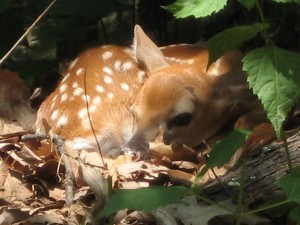 The West Virginia Division of Natural Resources advises people to leave all young wildlife alone. “The spring season is the time of year when the woods and fields of West Virginia are full of new life,” said Rob Silvester, district wildlife biologist stationed in French Creek. “People have a great opportunity to view and enjoy young wildlife during this season, but it is especially important for the public to understand the need to avoid touching or disturbing these wild animals.”
The West Virginia Division of Natural Resources advises people to leave all young wildlife alone. “The spring season is the time of year when the woods and fields of West Virginia are full of new life,” said Rob Silvester, district wildlife biologist stationed in French Creek. “People have a great opportunity to view and enjoy young wildlife during this season, but it is especially important for the public to understand the need to avoid touching or disturbing these wild animals.”
Attempts to rescue or rehabilitate young wildlife are often counter-productive, according to Silvester. Picking up or getting too close to wildlife greatly increases the chance of harm to the animal and/or the persons involved in this unwise practice. By touching young animals, humans leave a scent that may attract a predator. Wildlife viewing is an enjoyable and perfectly acceptable activity; however, Wildlife Resources Section personnel recommend that this pastime be conducted from a safe distance and with the aid of binoculars.
“In addition to being detrimental to the welfare of young animals, handling wildlife potentially may expose humans to various wildlife-associated diseases, parasites and other health-related risks,” said Silvester. “Rabies, roundworms and other parasites such as lice and ticks can be transmitted to humans through the improper handling of wildlife.”
DNR offices statewide receive numerous calls each year concerning young wildlife, especially fawn deer that have been picked up by well-meaning residents. In almost every case these young animals have not been abandoned. The offspring are often hidden as the adult searches for food and this separation can last for a few hours or all day.
“Humans are poor substitute parents for wild animals, because young wildlife require special diets and learn survival skills from their parents,” Silvester said. “Removing young wildlife from their natural environment almost certainly leads to the death of the animal.”
Many people often mistake a bedded fawn, with no mother in sight, as abandoned, but that is usually not the case. Hiding the fawn and leaving it while the doe searches for food is an important survival tactic. The spotted pattern and coloration of fawns and their lack of scent afford protection to these young animals and make them difficult for predators to detect.
If a predator happens to approach close to a fawn, the young deer will normally hold very still until the threat passes. If discovered by a predator, the fawn will wait until the last moment before fleeing. The doe will come back to check on her fawn at feeding time.
As a final caution, remember that state law prohibits the possession of wildlife without a permit. When you pick up a young animal in the wild, you have taken it into your possession. The fines for illegal possession of a fawn deer, black bear cub, baby raccoon, squirrel or any other species taken or possessed during the closed season range from $20 up to a maximum of $1,000 and/or up to 100 days in jail.
“We want everyone to enjoy West Virginia’s wildlife,” said Silvester. “However, for your safety and that of animals, remember these wild animals should be left alone and allowed to stay wild.”



